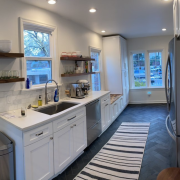21 Ways to Stay Compliant When Building a New Home
Building a new home is an exciting journey, but it comes with a lot of responsibilities. Staying compliant with local regulations, permits, and construction standards ensures your dream home is built safely and efficiently. Here’s a comprehensive checklist to help you navigate the process while addressing key questions like building a new home checklist, how to find a builder for a new home, and more.
1. Obtain Necessary Permits
Start by securing all required building permits from your local government. These permits ensure your construction meets zoning and safety regulations.
2. Hire a Licensed Builder
How to find a builder for a new home? Look for a licensed and insured contractor with experience in new builds to avoid costly mistakes and delays.
3. Review Local Building Codes
Every area has specific building codes. Ensure your project complies with local requirements for safety, materials, and design.
4. Conduct a Site Survey
A site survey ensures your home is built on solid ground and identifies any potential issues like soil stability or water drainage.
5. Check Zoning Regulations
Verify that your property is zoned for residential construction and that your plans align with zoning laws.
6. Develop a Comprehensive Plan
Include all details in your construction plan, from layout and materials to estimated timelines. This step is crucial for meeting legal requirements.
7. Work with an Architect
An experienced architect can design a home that adheres to codes and reflects your vision.
8. Schedule Regular Inspections
Should I get a home inspection on a new build? Absolutely. Inspections during construction help catch issues early, ensuring compliance at every stage.
9. Prioritize Safety Standards
From electrical wiring to structural integrity, safety should always be a top priority.
10. Address Environmental Concerns
Be mindful of environmental regulations, such as proper waste disposal and energy-efficient building practices.
11. Choose Quality Materials
Using substandard materials can lead to compliance violations. Invest in high-quality, durable options.
12. Monitor Construction Progress
Regularly visit the site to ensure everything is proceeding as planned and in compliance with regulations.
13. Communicate with Your Builder
Clear communication with your contractor helps avoid misunderstandings that could lead to non-compliance.
14. Understand HOA Requirements
If your home is in a community with a homeowners association (HOA), ensure your design meets their guidelines.
15. Budget for Contingencies
Unexpected issues can arise during construction. Having a contingency budget ensures you can address them without compromising compliance.
16. Plan for Utilities
Coordinate with local utility providers to ensure your home has proper water, electricity, and gas connections.
17. Address Accessibility Needs
Incorporate accessibility features like ramps or wider doorways if required by law or personal needs.
18. Review Contract Agreements
Make sure contracts with builders, subcontractors, and suppliers include clauses for compliance with regulations.
19. Consider Negotiation
Can you negotiate on a new build home? Yes, you can negotiate upgrades, closing costs, or other perks with your builder.
20. Final Walkthrough
Before closing, conduct a final walkthrough to ensure everything meets standards and your expectations.
21. Obtain a Certificate of Occupancy
Once construction is complete, obtain a certificate of occupancy to confirm your home is safe and ready to live in.
Conclusion
Building a new home is an intricate process, but staying compliant doesn’t have to be overwhelming. Use this building a new home checklist and follow the tips above to ensure your home is built safely, legally, and to your satisfaction.
Need professional help? At Pluum Construction, we specialize in creating compliant, high-quality homes. Contact us today to start building your dream home with confidence!










Leave a Reply
Want to join the discussion?Feel free to contribute!